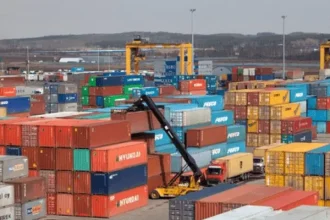The United States and Britain are reportedly preparing to announce a trade agreement on Thursday, marking a potentially significant development amid President Donald Trump’s sweeping tariff measures.
However, reports suggest the agreement may be limited in scope and more of a framework than a fully finalised deal.
According to The New York Times and Politico, the agreement will be with the United Kingdom, citing multiple sources familiar with the discussions. The Wall Street Journal described the expected announcement as a “framework” of a deal rather than a comprehensive trade pact.
If confirmed, it would represent the first such agreement since President Trump imposed broad 10 per cent tariffs on global imports—including British goods—on what he termed “Liberation Day” on April 2. The administration temporarily paused harsher tariffs on several countries to allow room for negotiations.
Trump signalled the pending announcement in a post on Wednesday, writing that a “major trade deal” would be revealed with a “big, and highly respected country.”
Nonetheless, analysts and media outlets remain uncertain about the depth of the expected US-UK arrangement. It is unclear whether it will amount to a fully ratified agreement or simply a preliminary outline that will require further negotiation.
Trump is scheduled to formally announce the deal during a 10:00 am (1400 GMT) news conference in the Oval Office at the White House, promoting it as the “first of many.”
In London, Downing Street confirmed that British Prime Minister Keir Starmer would provide an update on trade discussions with the United States later in the day.
“Talks on a deal between our countries have been continuing at pace and the prime minister will update later today,” a spokeswoman said.
Starmer, who, like Trump, assumed power last year, had been advocating for a trade accord with the US even before Trump initiated his global tariff strategy that affected Britain and several other nations.
A post-Brexit trade agreement with Washington has long been a top priority for London since the UK’s formal departure from the European Union. The UK is eager to reach an agreement with the United States ahead of a pivotal EU-UK summit on May 19 aimed at resetting diplomatic and trade relations with the 27-member bloc.
A US-UK deal could potentially complicate the EU’s own efforts to secure a trade pact with Washington, which have faced significant hurdles.
Earlier this week, Britain finalised a free trade agreement with India—its largest such deal since exiting the EU—following renewed negotiations in February, which were reportedly motivated in part by US tariff threats.
Despite ongoing tensions, the EU remains Britain’s largest trading partner, while the US is the UK’s single largest country trading partner.
President Trump has repeatedly claimed that countries around the world are eager to secure trade deals with the United States. Reports have indicated that Washington might consider lowering some tariffs on British products in exchange for relief from the UK’s digital services tax, which targets American tech giants.
So far, London has refrained from retaliating against Trump’s initial 10 percent tariff on UK imports, as well as the steeper 25 per cent tariffs on steel, aluminium, and automobiles.
“Any deal with the US is likely to be damage limitation rather than an economic boost,” said Jonathan Portes, professor of economics at King’s College London, in an interview with AFP. “That is, it is likely to limit the Trump tariffs, but … exporters will probably still be facing higher tariffs overall than they were last year.”
Jim Reid, an analyst at Deutsche Bank, added: “Given that full trade deals take years to negotiate, this will likely be a framework and it will be interesting to see whether the 10-percent baseline tariff stays, as that will provide an important template for negotiations with other countries.”
The announcement also comes as the Bank of England is widely expected to cut its benchmark interest rate by a quarter point, a move linked to concerns over the economic fallout from Trump’s tariff policy and its potential to dampen global growth.
Prime Minister Starmer had visited Washington in late February to discuss tariff issues and returned optimistic that a breakthrough could be achieved. During the visit, Trump praised Starmer as a “tough negotiator” and held out the possibility of a “great” trade agreement between the two nations.
Starmer also extended an invitation to President Trump for a rare second state visit to the United Kingdom to meet King Charles III—a gesture London hopes will help strengthen transatlantic ties.
The 78-year-old Republican leader has long expressed admiration for the British royal family and maintains a personal connection to the UK through his mother, who was born in Scotland. Trump also owns a golf course there, underscoring his longstanding affinity for the country.







